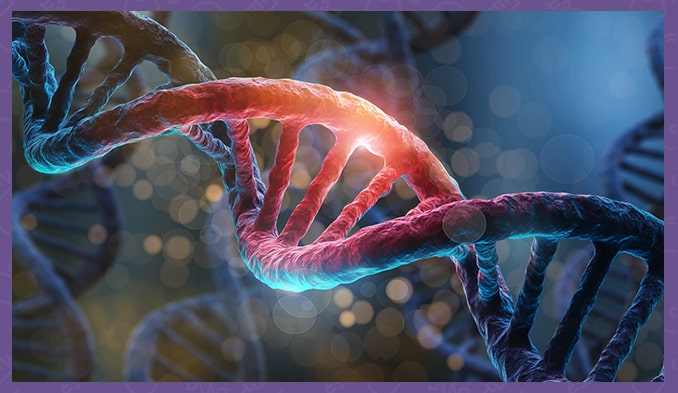PTEN and STK11 are genes giving the "command" to produce specific enzymes in the body. These enzymes are found in almost all body tissues and act as tumour suppressors, i.e. they inhibit the activation and activity of cancer cells. The enzymes in question regulate cell division and prevent the uncontrolled growth of abnormal cells.
The STK11 gene, also called LKB1, is responsible for the synthesis of the enzyme serine/ threonine kinase 11. It inhibits tumor growth and controls the proper division of normal cells. In addition to its role as a tumor suppressor, STK11 is required for normal fetal development during pregnancy.
Mutations in these two genes reduce the protective function of guardian enzymes and allow tumours to grow.
Which types of tumors are associated with the mutation in PTEN and STK11?
Mutations in the PTEN gene have been reported in many types of carcinomas and studies have shown that PTEN may be the most commonly mutated gene in prostate and endometrial carcinoma. PTEN gene mutations are also commonly found in brain tumors called glioblastomas and astrocytomas, and in an aggressive form of skin cancer called melanoma. In some cases, the reason for detecting a PTEN gene mutation in genetic testing is the very advanced stage of tumour growth, i.e. the aggressiveness of the tumour may change the gene due to the strong effects on the enzymes it is responsible for.
Inherited mutations in the PTEN gene increase the risk of developing breast cancer and the mutation could be detected by targeted genetic testing. It is also possible that there is a non-inherited mutation that can only be detected by examining certain cells locally in the breast.
STK11 is a gene whose inherited mutation is responsible for an increased risk of developing breast cancer. In case the mutation is not inherited, but occurred during the course of life (somatic), we can associate several types of carcinoma with STK11:
- Non-small cell lung carcinoma;
- Cervical carcinoma;
- Colon carcinoma;
- Melan;
- Carcinoma of the pancreas;
As mentioned earlier, STK11 is important in proper fetal development during pregnancy. It has been found that a woman who carries a PTEN gene mutation and has it manifest as mammary carcinoma, her child may have this mutation manifest as autism.
When is it good to test PTEN and STK11 combined?
- With evidence of cervical cancer, with or without a family history of the disease;
- In suspected colon cancer and differential diagnosis;
- When breast cancer is detected before the age of 50;
- In young patients with two or more close relatives with breast cancer or another type of cancer;
- When the body responds inadequately to treatment with Herceptin, used in the treatment of breast cancer. Studies have shown that loss of a functional enzyme from the PTEN gene is associated with poor response to the drug.
How is the research done?
A blood sample is taken and sent for laboratory analysis. The analysis is performed by genome sequencing and the results take 3 to 5 weeks to be ready.








